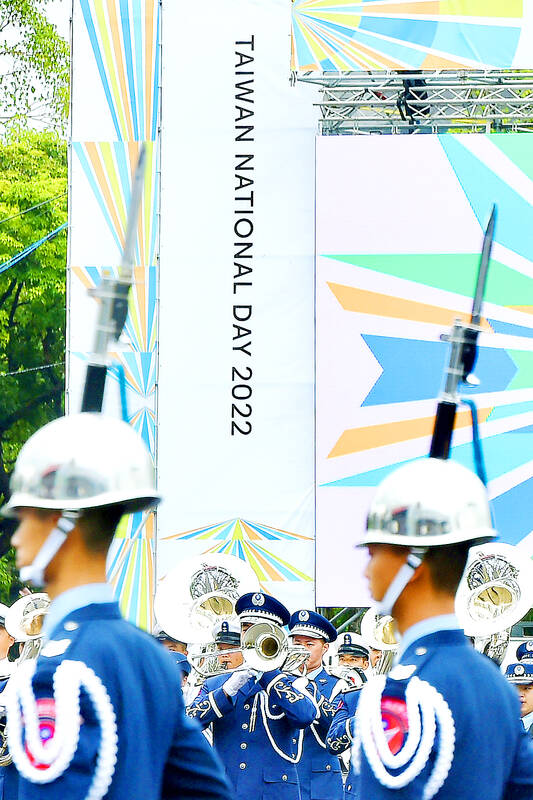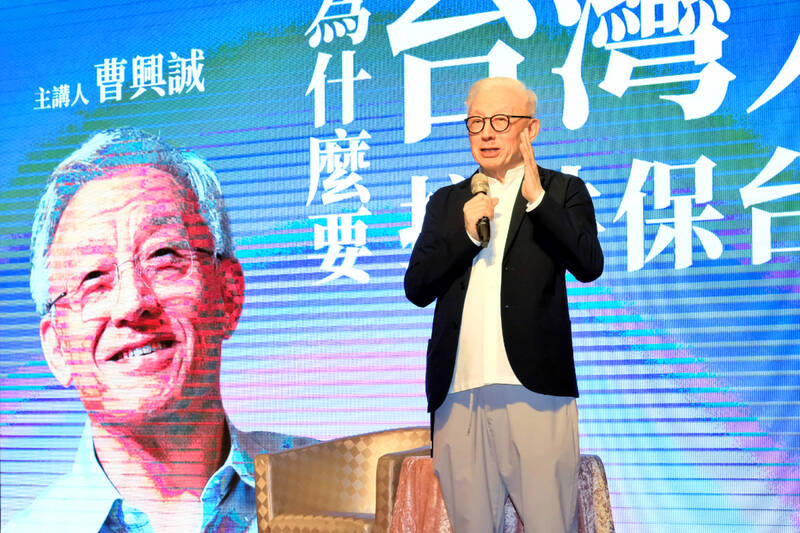Business tycoon Robert Tsao (曹興誠) on Friday chided former president Ma Ying-jeou (馬英九) for opposing the use of the term “Taiwan National Day” in material promoting Double Ten National Day celebrations.
Tsao said the former president, of the Chinese Nationalist Party (KMT), identifies with China instead of with Taiwan.
Tsao’s remarks came after Ma said President Tsai Ing-wen (蔡英文) should stop using “Taiwan National Day” and that any such reference should be removed from promotional material and banners for the celebrations.

Photo: Tu Chien-jung, Taipei Times
“The term has not been used before by previous governments,” Ma said. “I had no idea the name ‘Republic of China’ (ROC) has been changed to ‘Taiwan.’”
Tsao wrote on social media that Ma believes “both sides of the Taiwan Strait belong to one China” and that “no territory can be separated from the motherland.”
Tsao called the former president’s view “obsolete.”

Photo: CNA
“I want to ask this Chinese person, Ma Ying-jeou, how much longer will you be bullying Taiwanese?” he wrote.
Ma is hostile toward Taiwanese independence, he added.
Tsao is the founder of semiconductor maker United Microelectronics Corp (UMC). He became a Singaporean national in 2011, in part because of lingering dismay over government restrictions on UMC’s ability to invest in China.
However, he has recently become a vocal critic of Beijing.
In the wake of large-scale military drills China launched around Taiwan after a visit to Taipei by US House of Representatives Speaker Nancy Pelosi in August, Tsao vowed to donate NT$3 billion (US$94.7 million) to help Taiwan bolster its defenses, including by setting up local militia units — or “black bear warriors” (黑熊戰士) — who would be trained in combat tactics, guerrilla warfare, cognitive warfare and first aid. He also pledged to fund the domestic production of 1 million combat drones.
“Under the former KMT regime led by Chiang Kai-shek (蔣介石) and later his son, ‘one China’ referred to the ROC, and it was illegal to advocate for the People’s Republic of China (PRC). Chiang viewed the PRC government as communist bandits and the sworn enemy who must be exterminated,” Tsao wrote.
“Nowadays, the PRC is threatening to exterminate the ROC,” Tsao wrote.
The hostility between the two governments stem from the Chinese Civil War, he wrote, adding that “Taiwanese have nothing to do with it.”
Taiwan should refer to itself more often as “Taiwan,” instead of using its official name, Tsao said.
It would help Taiwanese avoid falling “into the trap of the Chinese Civil War,” he wrote.
Ma opposes using “Taiwan” to refer to the nation and has on multiple occasions used the argument that “there is only one China” against it, Tsao wrote.
“This shows Ma is Chinese and that he colludes with the Chinese government to bully Taiwan,” Tsao added.
The ROC Constitution remaining in place in Taiwan “brings nothing but disaster,” Tsao added, adding that Ma is against drafting a new constitution.
“I want to ask Ma: Do you have any moral conscience in you?” he asked
Separately, Premier Su Tseng-chang (蘇貞昌) said most foreign diplomats based in Taiwan and visitors to the nation refer to it as Taiwan, instead of the ROC.
“The international community distinguishes us from China,” Su said.
When Taiwan refers to itself as the ROC in international forums, it might be mistaken as referring to China, he said.
As for Double Ten National Day, Su said there are multiple ways to refer to it.

Taiwan has received more than US$70 million in royalties as of the end of last year from developing the F-16V jet as countries worldwide purchase or upgrade to this popular model, government and military officials said on Saturday. Taiwan funded the development of the F-16V jet and ended up the sole investor as other countries withdrew from the program. Now the F-16V is increasingly popular and countries must pay Taiwan a percentage in royalties when they purchase new F-16V aircraft or upgrade older F-16 models. The next five years are expected to be the peak for these royalties, with Taiwan potentially earning

STAY IN YOUR LANE: As the US and Israel attack Iran, the ministry has warned China not to overstep by including Taiwanese citizens in its evacuation orders The Ministry of Foreign Affairs (MOFA) yesterday rebuked a statement by China’s embassy in Israel that it would evacuate Taiwanese holders of Chinese travel documents from Israel amid the latter’s escalating conflict with Iran. Tensions have risen across the Middle East in the wake of US and Israeli airstrikes on Iran beginning Saturday. China subsequently issued an evacuation notice for its citizens. In a news release, the Chinese embassy in Israel said holders of “Taiwan compatriot permits (台胞證)” issued to Taiwanese nationals by Chinese authorities for travel to China — could register for evacuation to Egypt. In Taipei, the ministry yesterday said Taiwan

‘LIKE-MINDED PARTNER’: Tako van Popta said it would be inappropriate to delay signing the deal with Taiwan because of China, adding he would promote the issue Canadian senators have stressed Taiwan’s importance for international trade and expressed enthusiasm for ensuring the Taiwan-Canada trade cooperation framework agreement is implemented this year. Representative to Canada Harry Tseng (曾厚仁) in an interview with the Central News Agency (CNA) said he was increasingly uneasy about Ottawa’s delays in signing the agreement, especially as Ottawa has warmed toward Beijing. There are “no negotiations left. Not only [is it] initialed, we have three versions of the text ready: English, French and Mandarin,” Tseng said. “That tells you how close we are to the final signature.” Tseng said that he hoped Canadian Prime Minister Mark Carney

Taiwan is awaiting official notification from the US regarding the status of the Agreement on Reciprocal Trade (ART) after the US Supreme Court ruled US President Donald Trump's global tariffs unconstitutional. Speaking to reporters before a legislative hearing today, Premier Cho Jung-tai (卓榮泰) said that Taiwan's negotiation team remains focused on ensuring that the bilateral trade deal remains intact despite the legal challenge to Trump's tariff policy. "The US has pledged to notify its trade partners once the subsequent administrative and legal processes are finalized, and that certainly includes Taiwan," Cho said when asked about opposition parties’ doubts that the ART was